
Photo by René Riegal on Unsplash
Join us for a groundbreaking exploration of the concept of behavioural modernity.
Behavioral Modernity is a concept that has been used principally by cognitive archaeologists to answer the question “When and why did we start to act the way we do now?” In short, behavioral modernity answers this question by attempting to conceptualize what it is for us to be modern, in terms of how we behave. This concept has been cashed out both in terms of a “shopping list” or relevant behaviors and as a single set of capabilities, such as symbolic cognition.
This workshop is aimed at assessing both the concept of behavioral modernity itself and the debates surrounding it. Key themes will include symbolic cognition and material symbols, the link between cognitive capacity, behavior, and archaeological record, and the origins and evolution of modern behavior.
Speakers:
- Mark Collard
- Mary Stiner
- Anton Killin & Ross Pain
- Steven Kuhn
- Andra Meneganzin
- Peter Hiscock & Kim Sterelny
- Ron Planer
- Dietrich Stout
This event is free to attend, but spots are limited. Secure your place by contacting Thomas Graham at Thomas.Graham@anu.edu.au.
Location
Contact
- Thomas Graham
File attachments
| Attachment | Size |
|---|---|
| Titles_Abstracts_and_program_PhilCogArch_2024.pdf(1.02 MB) | 1.02 MB |